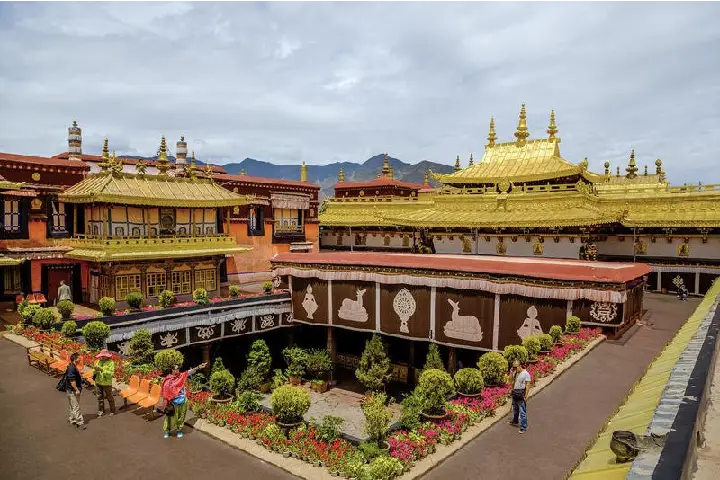

Tibetans have immolated themselves in protest against China at the Jokhang temple (Photo: Twitter/@thesilkroad)
A new US State Department report chronicles China’s oppression of Tibetan Buddhist practitioners and efforts to keep two of the religion’s most prominent leaders out of sight inside Tibet.
The State Department’s 2022 Report on International Religious Freedom, released on Monday, documents allegations of “forced disappearances, arrests, physical abuse and prolonged detentions without trial of monks, nuns and other persons due to their religious practices” in Chinese-occupied Tibet last year.
The report arrives just days before the 28th anniversary of China’s abduction of the Panchen Lama, a high-ranking Tibetan Buddhist figure who has not been seen in public since his forced disappearance at the age of six.
The report also addresses China’s ongoing refusal to negotiate with the envoys of the Dalai Lama, the Nobel Peace Prize-winning Tibetan Buddhist leader, whom China forced into exile from Tibet more than 60 years ago.
Secretary of State Antony J. Blinken and Ambassador-at-Large for International Religious Freedom Rashad Hussain released the report at an event at the State Department attended by International Campaign for Tibet President Tencho Gyatso.
“I was grateful to join other civil society leaders and religious freedom advocates at the release of the 2022 Report on International Religious Freedom, and I’m grateful to the State Department for shining a spotlight on China’s oppression of religious worshippers in Tibet,” Gyatso said.
“As the report shows, Tibetans face horrific abuse from China’s government for attempting to practice their faith freely, speak up for their religious rights or venerate their spiritual leaders like the Dalai Lama and the Panchen Lama. The best way to bring this oppression to an end is to push for renewed dialogue between China and the Dalai Lama’s envoys by passing the bipartisan Promoting a Resolution to the Tibet-China Conflict Act currently in the Congress.”
According to the report, Chinese authorities in the Tibet Autonomous Region, which spans about half of Tibet, required clergy and Tibetan government employees to denounce the Dalai Lama, who has not set foot in Tibet since his forced exile in 1959.
“Authorities also continued to force monasteries to display portraits of (Chinese Communist Party) leaders and required Tibetans to replace images of the Dalai Lama and other lamas in their homes with portraits of CCP leaders, including former Chairman Mao Zedong and General Secretary and (People’s Republic of China) President Xi Jinping,” the report says.
“Images of the Dalai Lama were banned, with harsh repercussions for owning or displaying his image.”
As one example, the report, citing news articles and rights groups, says Chinese Police arrested a Tibetan named Zumkar after finding a photo of the Dalai Lama on her home altar. They also arrested her sister Youdon for colluding with Zumkar to conceal the photo.
According to the report, authorities also required clergy and government employees to pledge allegiance to Gyaltsen Norbu, whom Chinese leaders appointed as their own Panchen Lama after kidnapping Gedhun Choekyi Nyima — on May 17, 1995.
Traditionally, the Panchen Lama and the Dalai Lama have played a key role in identifying one another’s reincarnations.
With the current Dalai Lama about to turn 88-years-old, China has made clear it plans to appoint its own successor to the globally revered Buddhist leader.
However, according to the report, US officials last year “underscored that decisions on the succession of the Dalai Lama should be made solely by the Tibetan people, free from interference, and they raised concerns about the disappearance since 1995 of Panchen Lama Gedhun Choekyi Nyima”.
China also cracked down on ordinary practitioners of Tibetan Buddhism last year, according to the report.
It says China “continued to place restrictions on the size of Buddhist monasteries and other institutions and to implement a campaign begun in 2016 to evict monks and nuns from monasteries”.
Between 6,000 and 17,000 monks and nuns were evicted over three years from the Larung Gar and Yachen Gar Buddhist institutes, the report says.
Those expelled were forbidden from continuing their religious education elsewhere; instead, many of them were forced to undergo “patriotic education”.
External Affairs Ministry Spokesperson Randhir Jaiswal on Thursday has reiterated India's stance on bilateral discussions…
India implemented a new visa module for Afghan nationals on April 29, Ministry of External…
India is in touch with Iranian authorities for locating three Indian nationals who went missing…
A citywide closure occurred throughout the Awaran district in Balochistan on Wednesday, with shops, businesses,…
The Czech Republic's government has officially linked a malicious cyberattack on its Ministry of Foreign…
Chief of Defence Staff General Anil Chauhan will visit Singapore from May 30 to June…